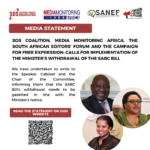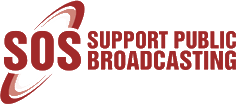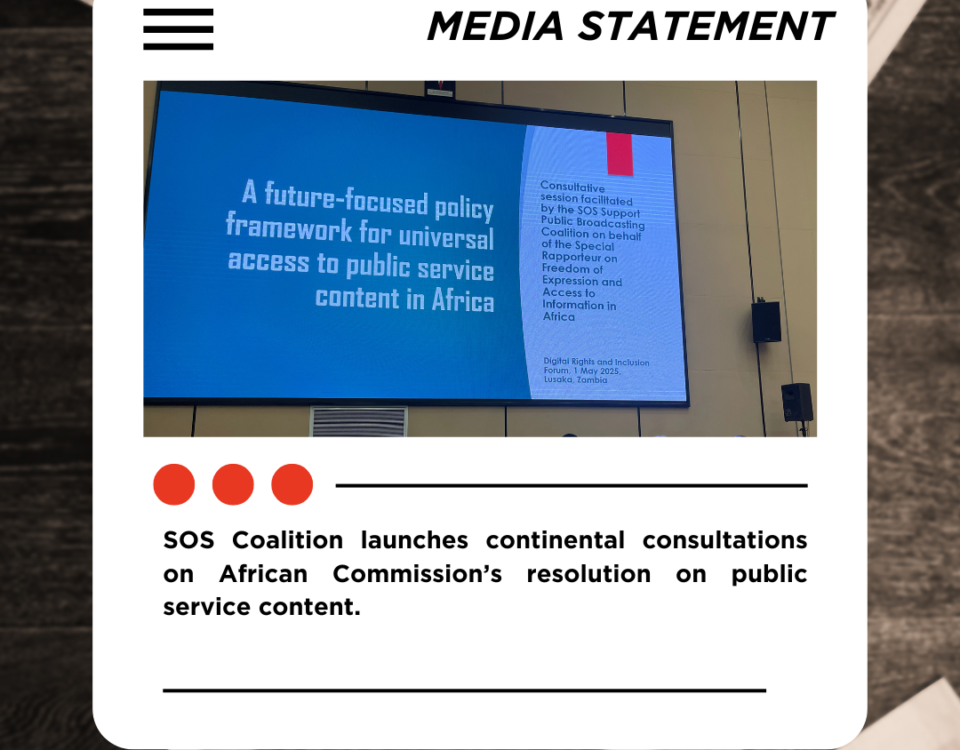
SOS COALITION, MEDIA MONITORING AFRICA, THE SOUTH AFRICAN EDITORS’ FORUM AND THE CAMPAIGN FOR FREE EXPRESSION: CALLS FOR IMPLEMENTATION OF THE MINISTER’S WITHDRAWAL OF THE SABC BILL
February 8, 2025Great victory for access to information and freedom of expression!
March 27, 2025SOS supports the African Commission in developing a new continental policy framework for universal access to public service content in the digital age
The African Commission on Human and Peoples’ Rights (ACHPR) has resolved to develop a new policy framework for universal access to public service content in Africa. This is in response to the challenges faced by traditional free-to-air broadcasters now having to compete in a multi-channel, largely unregulated, digital environment where audiences have access to audio and video produced and distributed by a range of actors.
Last week, at the end of its first sitting for 2025 the Commission – an organ of the African Union – mandated the Special Rapporteur on Freedom of Expression and Access to Information in Africa to develop guidelines for public service content in the digital age, in consultation with role players with an interest in broadcasting, freedom of expression, media freedom, digital rights, access to information policy and lawmaking.
The resolution builds on work done by the SOS Support Public Broadcasting Coalition (SOS) since last year to get expert input on a continental consultation project to develop a policy framework for universal access to public service content, which will be rolled out in line with the objectives of the ACHPR resolution and in consultation with the Special Rapporteur.
The first of a series of consultations is scheduled to take place at the Digital Rights and Inclusion Forum (DRIF) at the end of April in Lusaka, Zambia.
The full text of the ACHPR resolution acknowledges the continuing importance of access to distinctively public service content in a fast changing environment, hence the need to overhaul policy frameworks to be fit for purpose in the digital age.
The ACHPR resolution recognises the fast-changing context of the heavily regulated traditional African broadcast industry obligated to uphold ethical standards of editorial independence and public service, operating in the face of the proliferation of online services that are not regulated to meet public interest benchmarks. These include requirements to provide information and factual news, education programmes, youth services, local content and languages, and impartiality on elections coverage.
In a related development, the ACHPR also decided to develop guidelines for states to monitor the digital platforms’ performance regarding information integrity online and the role of independent fact-checking in the African context.
In 2024, SOS resolved to start a process to build a broad alliance advocating for and supporting the reforms now articulated in the ACHPR resolution, and will undertake broad consultations with diverse role players across the continent as its contribution to the future of universal access to public service content in Africa.
SOS has a 16 year track record in advocating for advancement of public service media and access to information, including a conducive regulatory framework in South Africa. Our expertise would be a fundamental contribution to the development of such guidelines.
We hope there will be an opportunity to collaborate with the Special Rapporteur to chart a way forward for access to public interest information in the digital age, across all platforms, in Africa.
For more information contact:
Uyanda Siyotula
National Coordinator
060 691 2462

